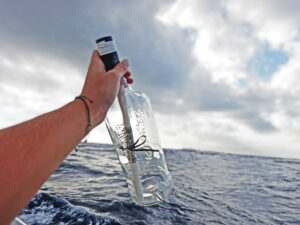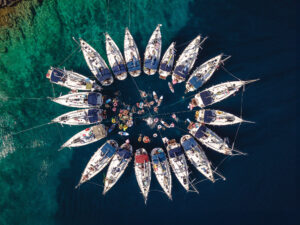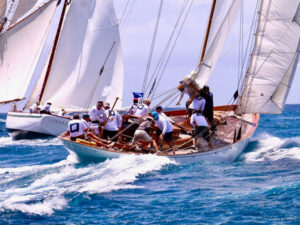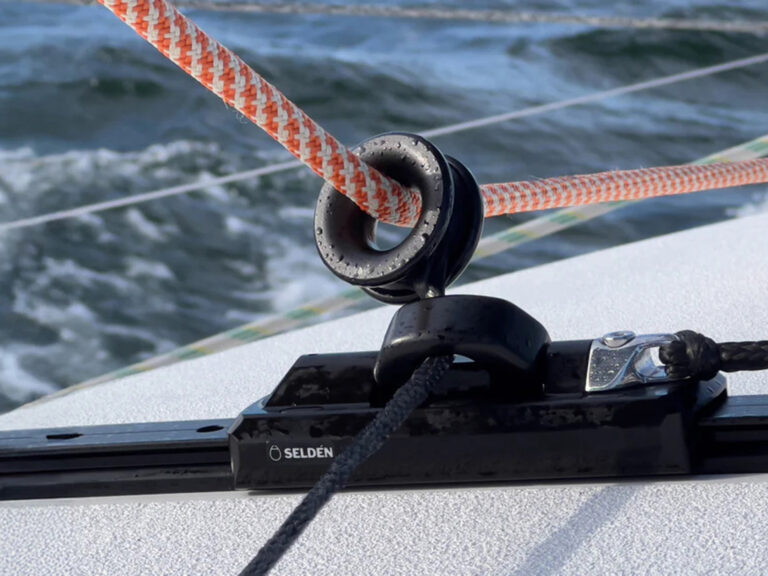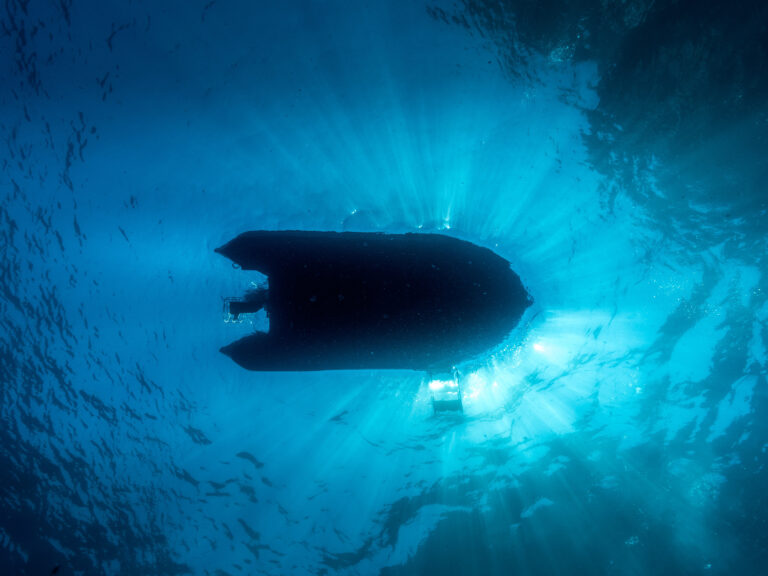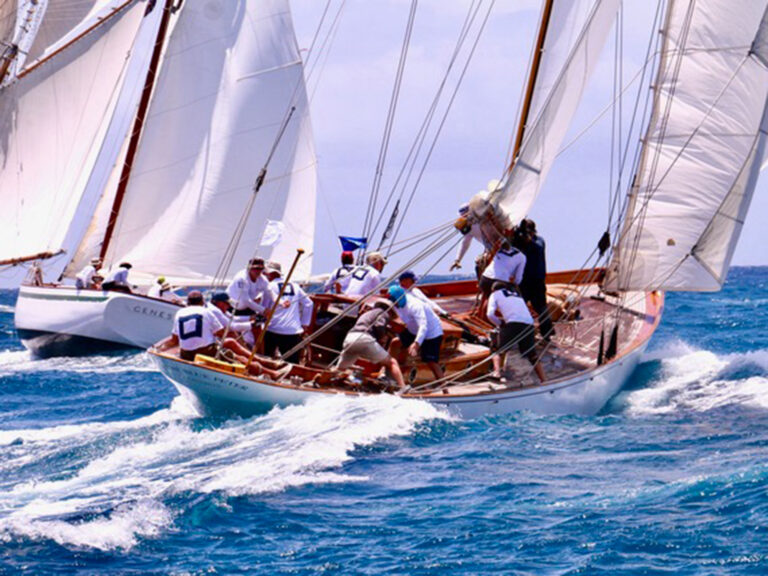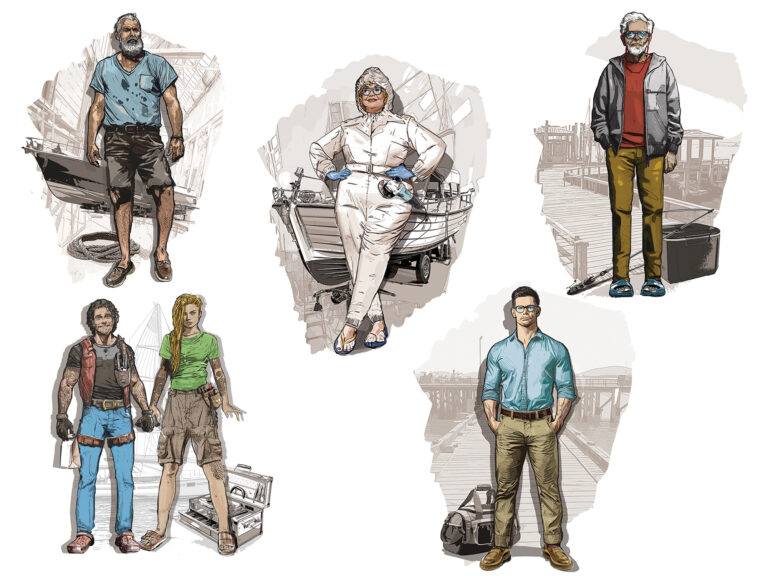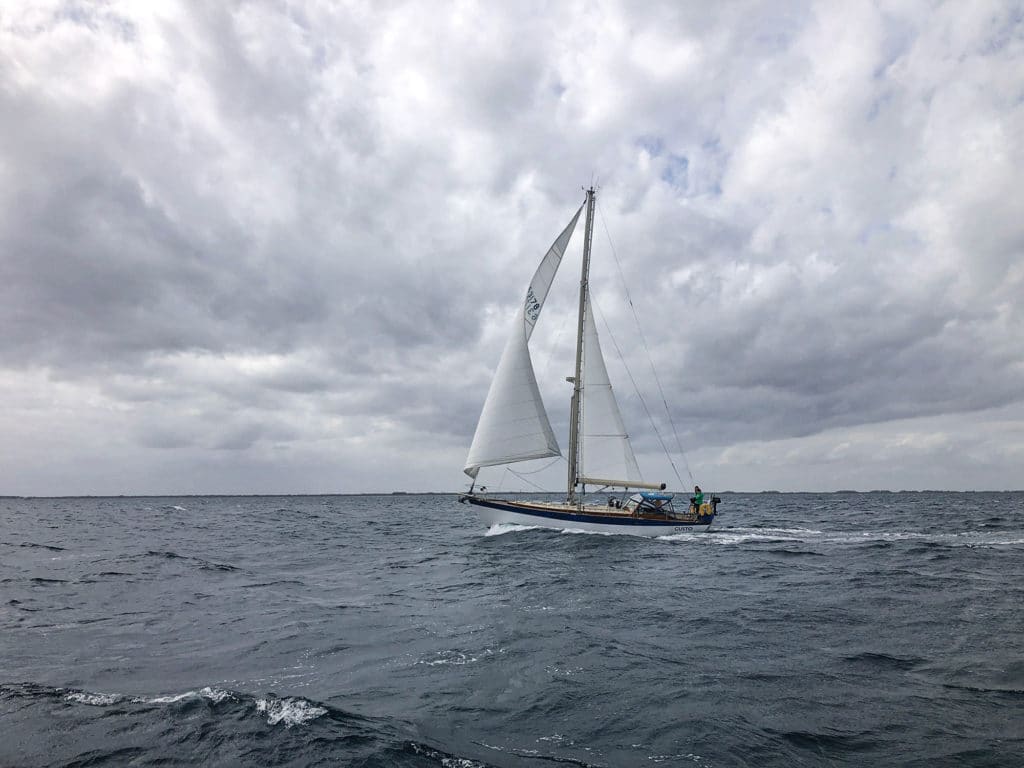
The good news was that we were making 7 knots; the bad news was that we surfed at 12 knots down building seas. We were 20 miles to seaward of St. Augustine, Florida. A wan December dawn lit up a storm petrel. We’d zoomed here from Hilton Head in 20 hours.
Following seas like those overwhelm the autopilot, so I was steering, and every wave brought us up and up for a view of tattered whitecaps, then released us on a luge run that settled us into its frothy trough. The cockpit was soaked from lashes of spray, and the companionway boards were bolted in. An hour earlier, I was on the pilot berth, half-sleeping and half-registering the violence in our motion. My wife, Whitney, came down to say “watch change,” and when she sat beside me, the stern slewed to one side, settled deep in a fluke wave, and: Bang! Splash! Drizzle! Salt water through the companionway, salt water gurgling out the scuppers, salt water pooling heavy in the cockpit…then Gusto rose again on the next wave.
Pooped! Nature’s power written in salt, wind and worry. A cantankerous wave had broken into us, and outside the crests were just getting bigger. When a wave comes and finds you in your bunk, it feels personal. That’s why I was hand-steering in the dawn, and that’s why I was thinking about Greek mythology.
The gods seemed angry. Atlantic sailors saw more hurricanes, gales and squalls in 2020 than ever before. Between the waves in the cockpit and the wind in the rigging, I got the message. For those of us living aboard small sailboats, the relevant gods are the old ones, the pagan ones, those who make it personal. It’s Poseidon, Aeolus and Triton who drive spray over my dodger or tear the sheet off my genoa; they embody the same elements I negotiate by sail. They also embody the fact that cruising sailors will need to adapt to the environmental changes reshaping the Atlantic.
We left Maine in mid-October to sail the East Coast to Florida, cross to the Bahamas, explore the Abacos, and then sail south toward the Exumas. That’s a straightforward goal for a sabbatical year. Plenty of blue water, and plenty of safe harbors too, for me, Whitney, and our 44-foot Chuck Paine-designed cutter, Gusto. The surprising thing was that the trip turned into a study on extreme weather, with conditions more severe than forecast, and conditions aboard more difficult than expected. The same old statistics about climate change are just not helpful anymore: hockey-stick graphs, parts per million, carbon sinks. It’s all so familiar that we barely see it anymore. Nonetheless, 2020’s stormy weather offers a pattern we have to decipher, and I think that sailors such as us can bring knowledge beyond the usual datasets and bromides about climate change.
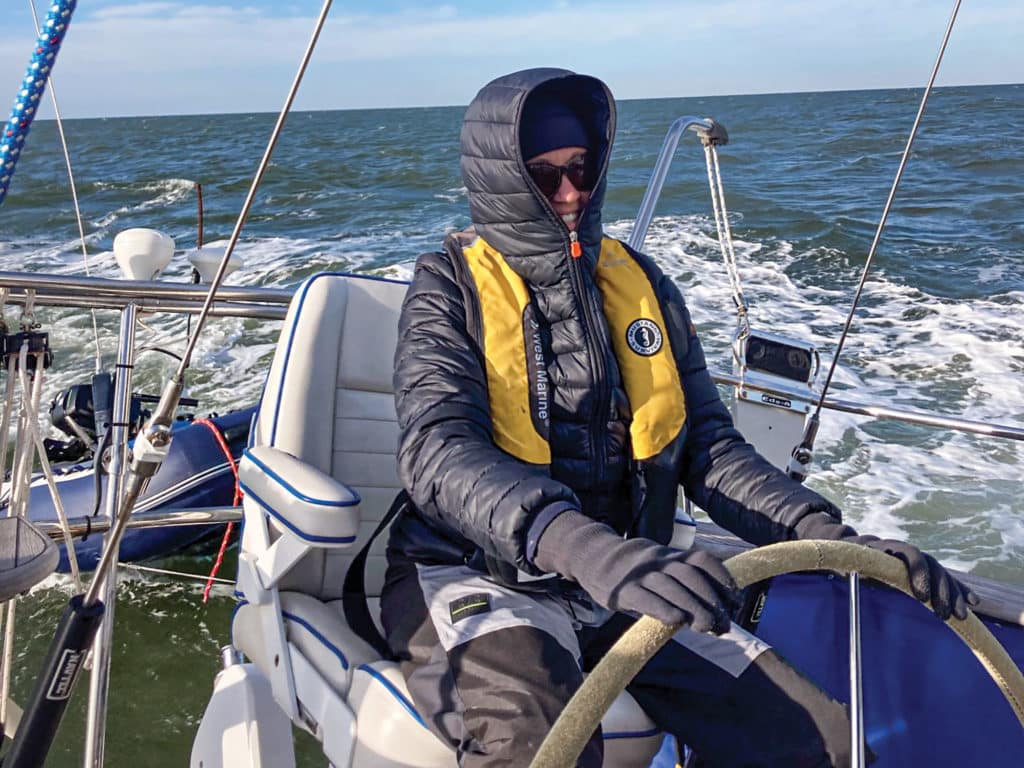
First off, the weather has been tough lately. This year, 2021, got off to a windy start. The previous year was the most active hurricane year on record, and it follows above-average hurricane years in 2016, 2017, 2018 and 2019. That seems like a trend. I’m writing this in the Abacos, where Hurricane Dorian devastated this little cay called Man-O-War and left nearby Marsh Harbour with 70,000 homeless after sustained 185-knot winds and a 23-foot storm surge. That was September 2019, and there are still boats in the trees here, and docks twisted like pretzels. Throughout fall 2020, we found breezy days becoming small-craft advisories, and small-craft days becoming gales, and gales becoming storms we hid from like crabs in shells.
A climate scientist friend tells me that the ocean holds 80 percent of the planet’s warming, and that when people talk global warming, they should be talking ocean warming. From his perspective, a changing climate is most likely to be expressed in a longer Atlantic hurricane season, more-vigorous tropical depressions, and stronger hurricanes. Coming south that fall, we saw hurricanes spinning south and west of us, and we watched the tropical depressions line up and march toward the US, with a record 12 named storms hitting the mainland.
What’s going on? A warmer climate is generating rowdier weather that makes life less predictable for cruisers in our little boats. Our cruising comfort is a small problem compared with the wrecked houses around me on Man-O-War Cay—that’s life and death, while cruising is a pursuit that thousands of us enjoy afloat. Still, amid these new conditions, sailors do have an intimate relationship to the forces of sea and sky, and it is this closeness that brings me back to the Greek gods.
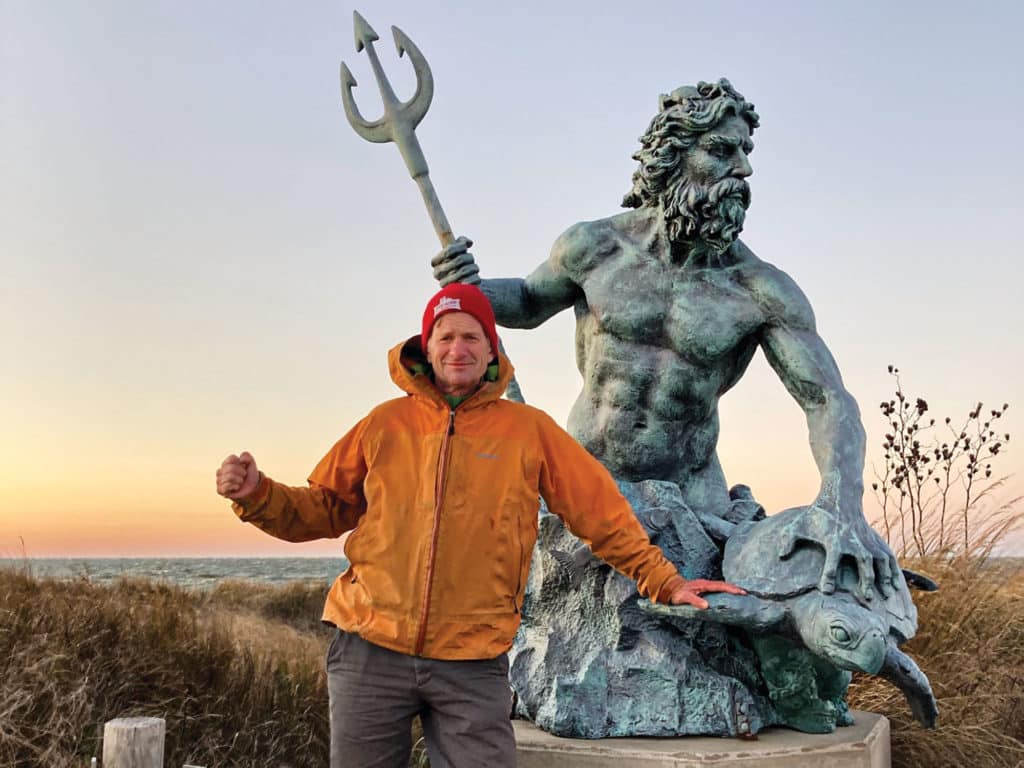
The ancient Greeks personified their gods into imperfect, fascinating beings who got jealous and frustrated and played favorites. Start with Poseidon, of course. The Greeks gave him the sea, while Zeus got the sky. Poseidon figures prominently in the Homer’s Odyssey because Odysseus angers him. The angry sea god wrecks Odysseus’ ship, drowns his companions, and leaves him a castaway for 10 years before washing him ashore. Not a kind and gentle god, Poseidon. Amphitrite is Poseidon’s wife, and to chasten you sailors, she controls huge waves and sea monsters; while to delight you, she made seals and dolphins. Their son, Triton, lives at the bottom of the sea, and he can blow a conch shell to raise or lower the waves that break into your cockpit if you’re not careful. It’s a double-edged sword with pagan deities: When they’re happy, they send you a friendly current or lift you around a cape, but when they feel slighted, these old gods will ruin your day.
Philosopher Glenn Albrecht calls climate change “the new abnormal,” and he writes, “We have nothing in our culture that enables us to come to grips with the changes that have occurred since the Industrial Revolution.” Albrecht is looking back two centuries; cruising sailors see harsher weather in the past two decades. Here in the resilient-but-battered Abacos, it’s blowing 30 again. The rigging drums on the mast, and I wonder if revisiting the old gods can bring me to a better grip on this new abnormal climate. The distant abstractions of climate science don’t register with me as directly as the eccentric, recognizable deities of the pagan ocean.
By reminding myself who these gods are, I know who to talk to when the going gets tough. I also know who to thank for the good times. For instance, the gods smiled on us rounding Cape Hatteras. We sailed toward Diamond Shoals in clouds so dark, the whitecaps seemed bright and the bow was blind to the stern. The forecast was for light winds when we motorsailed out of Cape Charles at sunrise, but sunset gave us 20 knots of breeze, midnight gave us 30, and at 0115, I was on deck checking the preventer on our reefed main. Should I be worried? Mist hid the lighthouse and the buoys, but as we approached the crux, a favorable current grabbed Gusto, eased the seas before us, and swept us between the shoals and the abandoned Texas Tower at 9 knots. It was like old Poseidon smiling when we touched 10 knots rounding that fierce cape, a speck of bubbling buoyancy amid grand forces.
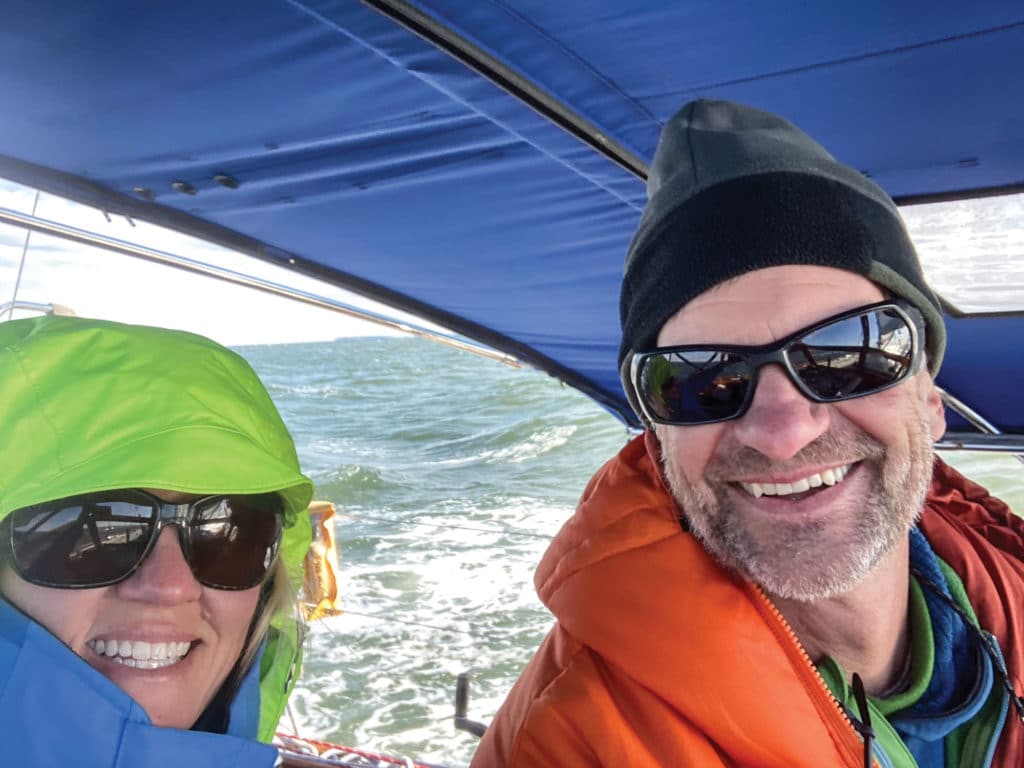
It wasn’t all smiles, though. Two days later, we were anchored in Beaufort, North Carolina, and the forecast northeaster built into a gale with lightning strikes. The current held us sideways to 50-knot gusts that dipped our rail like a ladle—the keeper of the winds, Aeolus, demanding attention. Around us, two boats dragged and one went ashore in a slow-motion funeral, while our dinghy flew like a kite from Gusto’s stern. Poseidon? The god of thunder was on the prowl too, and our hair stood up and the backstay crackled with close strikes. When Zeus blasts close enough to smell the ozone, it’s time to pay attention.
So, I wonder, have we sailors done anything to insult the natural world? Have we behaved recklessly or selfishly toward Poseidon’s domain? The warming climate is giving us all a harsher climate to navigate. The US Navy is planning accordingly for climate-change impacts, and so should the rest of us.
Think of the 2020 hurricane season: Sailors watched with surprise as the names ticked deep into the alphabet—from Arthur and Bertha to Isaias and Josephine, and then Teddy and Vicky before we found ourselves in a fraternity party of Greek names Delta and Epsilon, Theta and Iota. There’s so much heat and energy out in the Atlantic these days that cruising sailors need new ways to make sense of this new abnormal. These ancient gods and this weather combine to make climate change comprehensible when my direct experience of it is either too anecdotal to trust or too scientific to make human. On our trip south, we sailed in 30-plus knots more than 20 times. Hell, it’s blowing 30 in the anchorage as I write this! If the forecast gets overwhelmed once or twice, that’s happenstance, but if it gets overwhelmed a dozen times? The gods are telling you something.
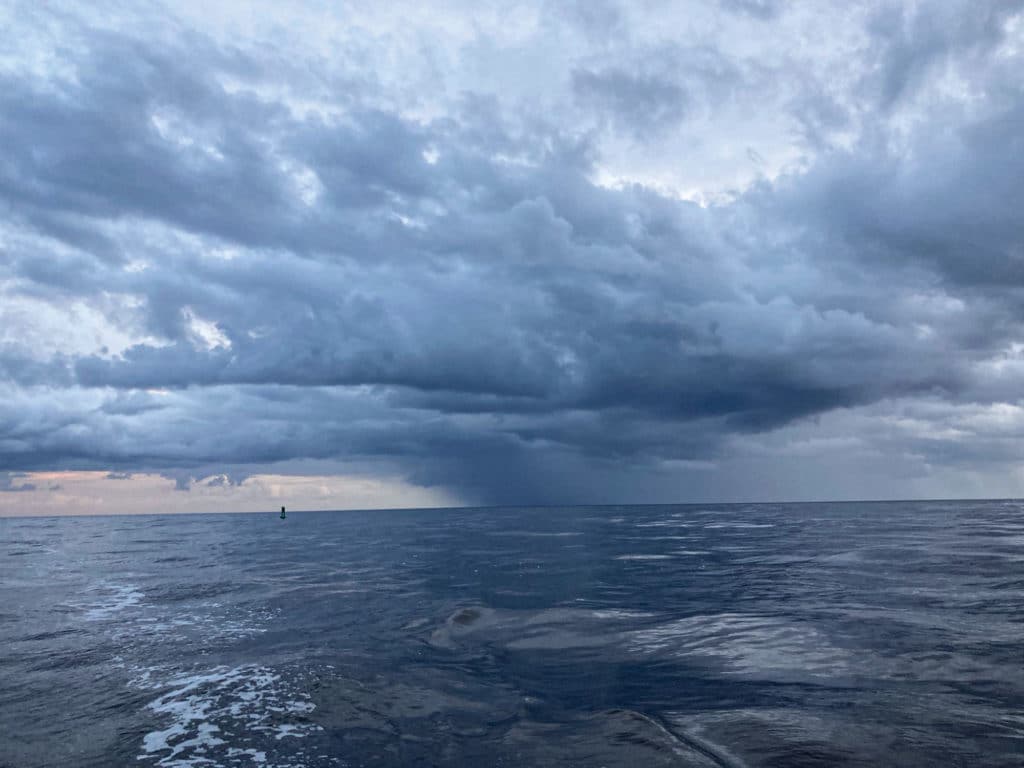
The unsympathetic will tell cruisers to “work around it” or “change your plans,” and that’s fair, but the window for passages is already tight. Think of the Bermuda race in early June, and the need to leave New England warm enough to feel your hands, but then turn around and get back ahead of the hurricanes in July. The reverse issue applies in the fall when New England cruisers (and their insurance companies!) wait for the end of hurricane danger but need to get south before cold winter gales batter them. We pushed off the last dock afloat in Falmouth, Maine, on October 18, with sleet in the air. All down the New England coast, mooring balls were out and docks were stored. We spent Halloween watching a snowstorm tear leaves from Connecticut oaks and strain our ground tackle. In short, a longer hurricane season brings cruisers a tight calendar for springtime passages, and then, come October, that same long hurricane season pushes cruisers to the doorway of unruly fall weather and winter. Most everyone we met in Florida talked about the year’s harsh conditions.
How are we to understand the changes that leave us precious little space to take our small boats and small crews on big passages? Well, Greek mythology is one approach, and I suggest it with a wry smile. Obviously, NOAA is a better resource for planning a passage than your Western Civilization textbook. But pulling back for the longer view, maybe there’s something useful in personifying the sea into a family of interests that I should conciliate instead of provoke. Maybe this climate-change crisis needs us to make it personal? A little less carbon, a little more green energy, a little less fast food and a little more gardening? Gusto’s cruise south warned me that our Atlantic sailing season is changing, and that sailors will need to adapt to a rowdier reality afloat, with bigger systems, hotter growth zones, tighter windows and pricier insurance. All these can be graphed and detailed, but the direct experience as waves crash over your foredeck is more visceral. To me, that physical connection with the elements is better captured by Poseidon and Triton than by climate science because those humanized gods tell me to take the new abnormal personally—it’s my fault and it’s my problem. So, when the wind moans in the rigging and the waves pile high above the transom, it’s the sea gods who seem angry, and the sea gods make it personal.
Jeffrey McCarthy is a professor at the University of Utah, where he is director of the Environmental Humanities graduate program. He sails Gusto out of Belfast, Maine.

